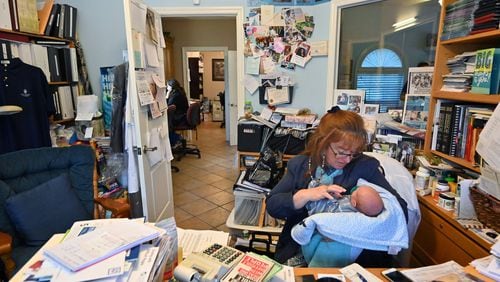Georgia Tech athletic director Todd Stansbury had to raid the cookie jar to pay for the hire of new football coach Geoff Collins and his staff.
The transition from coach Paul Johnson to Collins and the hiring of new staff cost the athletic department a little less than $6 million, associate AD for finance and administration Marvin Lewis said Thursday at the quarterly meeting of the Georgia Tech Athletic Association. Tech already was projecting to run a $2.8 million deficit for the fiscal year, but now will be closer to $9 million.
As a result, Tech’s fund balance – its money for a rainy day – has been depleted. It was about $6.65 million at the start of the fiscal year in July.
“It was a very smooth transition, but we knew there were going to be costs associated with it,” Stansbury told the AJC following the meeting.
With the coaching change, Tech is on the hook for paying the remaining salary for Johnson’s staff (contracts typically run July to June) and then has to start paying Collins and his new hires. Collins did not retain any of Johnson’s 10 assistant coaches and a number of other non-coaching staff and also hired 11 new off-field staff for a variety of roles, including recruiting, strength-and-conditioning and quality control.
Tech also covered Collins’ $2.5 million buyout to Temple – the athletic department paid for it by borrowing from the athletic association endowment fund– and began paying his $3 million salary in January. Also, as Johnson served as his own offensive coordinator, Stansbury had to allot money in a staff pool for an additional coordinator.
As transitions often include a firing and a buyout to the outgoing coach, Tech got off relatively light. Johnson will receive $250,000 annually for the next four years. He would have been owed $4 million had he been fired at the end of the 2018 season. Lewis said that transitions can cost between $10 and $12 million.
“In terms of our transition costs, we feel like, all things considered, we’re in good shape with how the transition’s been handled,” Lewis said.
At the meeting, school president G.P. “Bud” Peterson praised Stansbury for his management of the change.
“Paul felt good, Tech felt good, the fans, the alumni base, all felt good,” Peterson said. “I think Todd did a really nice job. These things are always hard, always challenging.”
Stansbury said that the salary pool for assistant coaches and non-coaching staff is considerably larger than it was for Johnson’s staff. Tech was already on its way to expanding off-field staff, having begun a $400,000 fundraising campaign last winter to fund additional recruiting staff.
Stansbury said that he gave Collins a budget to cover salaries for both assistant coaches and off-field staff such as strength-and-conditioning and recruiting staff. Stansbury said that he wanted to permit Collins to “move the deck chairs around” as he saw fit. Collins has hired a chief of staff and a director of applied sports science, for instance, positions that didn’t exist previously.
“Those are things that I think only the coach knows what they need and what’s important to them,” Stansbury said. “That was a way for us to give him the freedom to build the staff the way that he wanted.”
Tech anticipates that the reserve fund will be restored by fiscal year 2023, with expectations for revenue from the soon-to-launch ACC Network and increased ticket revenues from football. But, in the near future, Stansbury will have to hope there’s no unexpected costs.
“It just doesn’t give you that cushion that you would like to have,” he said. “All of the sudden, you don’t have much of a rainy-day fund. And that’s what the fund balance is for, for unforeseen circumstances – transitioning a football staff, something like that. So now we’ve got to be pretty disciplined in building that back up.”






